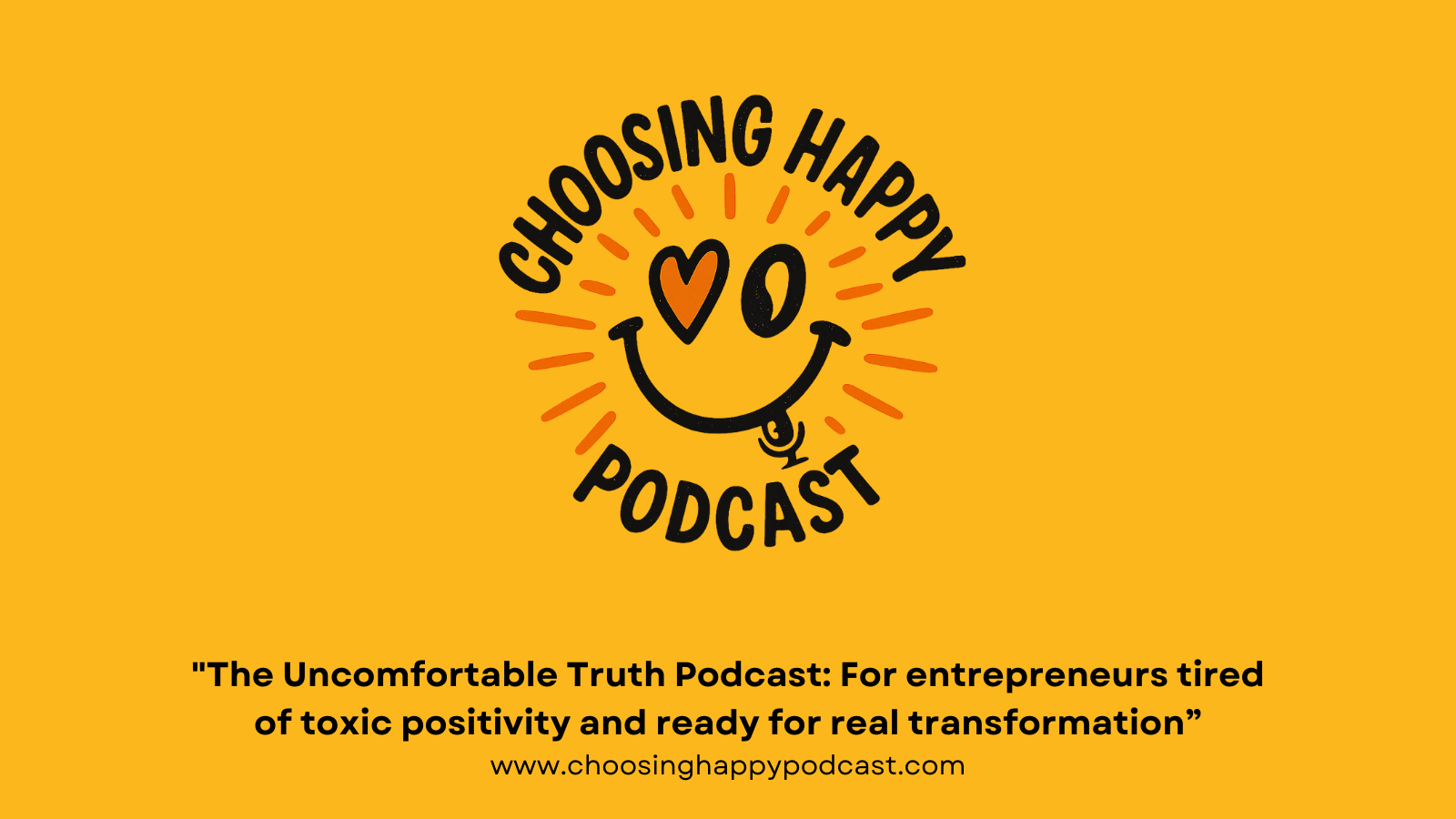Step Into Their Shoes: Unlocking Empathy for Better Relationships
Step Into Their Shoes: Unlocking Empathy for Better Relationships
Stepping into other people's shoes is a powerful practice that can transform your relationships, whether in business or personal life. By understanding others' perspectives, you can navigate conflicts more effectively, build stronger connections, and foster empathy in your interactions.
This episode explores how this technique applies to understanding your customers better than they know themselves, enhancing your marketing strategies, and cultivating trust within your team as a leader.
Additionally, we delve into the complexities of personal relationships, especially with friends and family, and how empathy can ease misunderstandings. Join us as we uncover practical ways to apply this transformative concept in your daily life and interactions.
This Episode:
Navigating the intricate web of human relationships requires more than just a willingness to empathize; it demands an active effort to understand the unique perspectives of others.
Heather Masters delves into this compelling theme in her latest episode of the Choosing Happy podcast, exploring how stepping into other people's shoes can dramatically shift our interactions in both personal and professional contexts. With a wealth of insights, she provides listeners with practical strategies to enhance their relationships and resolve conflicts by fostering a culture of empathy and understanding.
The episode highlights the importance of understanding your customer in the business realm. Heather articulates that creating a customer avatar is about gaining insights into the emotional state of your audience—recognizing their struggles and desires at a deep level. This understanding is crucial for businesses looking to stand out in an increasingly AI-driven market, where personalization can make all the difference. By knowing their customers better than they know themselves, businesses can tailor their messaging and offerings, leading to a more impactful connection. Heather shares compelling anecdotes that illustrate how brands that prioritize empathy in their marketing strategies can cultivate loyalty and trust among their customers.
Furthermore, Heather addresses the challenges of personal relationships, particularly familial ties that often become strained due to misunderstandings. She encourages listeners to approach family disagreements with an open mind, emphasizing the need for active listening and recognition of differing perspectives. By practicing empathy, we can navigate conflicts more effectively and strengthen the bonds that matter most. Heather’s insights serve as a powerful reminder that choosing to understand others not only enriches our lives but also leads us toward a path of greater happiness and fulfilment. This episode is a heartfelt invitation to embrace the power of perspective-taking in every interaction.
Takeaways:
- Stepping into other people's shoes fosters empathy, enhancing personal relationships and understanding.
- Understanding your customers deeply allows you to market to them effectively and authentically.
- In business, knowing your customer avatar helps tailor services that resonate with their needs.
- Conflict resolution in relationships can be achieved by considering the other person's perspective.
- Active listening in family discussions can bridge gaps and improve understanding during conflicts.
- Using perceptual positions in conflict situations leads to deeper insights and resolutions.
Timestamps:
- 00:02 - Introduction to Choosing Happy
- 00:06 - Exploring the Power of Perspective
- 01:51 - Understanding Empathy and Its Importance
- 01:58 - The Value of Stepping into Others' Shoes
- 03:59 - Applying Empathy in Business: Customer Understanding
- 04:49 - Creating a Customer Avatar
- 09:11 - The Impact of Understanding Employees
- 10:44 - Navigating Personal Relationships with Empathy
- 13:09 - Conflict Resolution in Family Relationships
- 15:37 - Techniques for Viewing Conflicts from Different Perspectives
- 19:03 - Conclusion: Embracing Empathy in Everyday Life
- 20:04 - Outro and Call to Action
Transcript
Hello and welcome to the Choosing Happy podcast.
Heather Masters:I'm Heather Masters and this week I'm exploring the art of putting yourself in other people's shoes and the advantages of being able to do that, especially in a world where we're looking like we are constantly in conflict and separation and disagreements, when really everyone at a high level want the same thing.
Heather Masters:They want the best for their family, for their friends and for the planet.
Heather Masters:They want to be able to laugh, to love, to have a future and to leave a legacy.
Heather Masters:And that's what we're going to look at today in terms of how you can resolve conflict, how you can have better relationships, and how you can thrive as a business by using this technique of stepping into other people's shoes.
Heather Masters:So stay tuned for this episode of the Choosing Happy podcast.
Heather Masters:Hello and welcome to the Choosing Happy podcast.
Heather Masters:I'm Heather Masters, and today we're exploring an incredibly powerful concept, the power of stepping into other people's shoes.
Heather Masters:And this idea goes beyond mere empathy.
Heather Masters:It's a transformative practice that can enhance our relationships, improve our business strategies, and help us navigate conflicts more effectively.
Heather Masters:So grab your favorite drink, I've got my coffee here.
Heather Masters:Get comfortable and let's dive in.
Heather Masters:Now let's begin by unpacking what it truly means to step into someone else's shoes.
Heather Masters:The concept is rooted in empathy, the ability to understand and share the feeling of another.
Heather Masters:Now imagine this scenario.
Heather Masters:You're having a tough day at work and your colleague snaps at you over a minor issue.
Heather Masters:It's easy to take that personally, but what if you paused for a moment and considered what might be going on in their life?
Heather Masters:Perhaps they're dealing with stress at home or facing deadlines that are really weighing heavily on them.
Heather Masters:By stepping into other people's shoes, you gain the insight into their behaviour and correspond with compassion rather than frustration.
Heather Masters:And this simple shift in perspective can transform your interactions.
Heather Masters:Another example of this is given by Stephen Covey in his book the Seven Habits of highly effective people.
Heather Masters:In that book, he talks about being at a railway station where dad and his children, his two children, are causing a bit of a ruckus.
Heather Masters:The children are running about a little bit uncontrollable, and everyone around is getting a bit annoyed at the fact that his father seems to be in a different space and not taking control of his children.
Heather Masters:And the story turns out out they have just come back from the funeral of their mother.
Heather Masters:So we never know.
Heather Masters:We really don't know often what people are facing.
Heather Masters:Even sometimes our best friends won't tell us everything in times of despair and real hardship.
Heather Masters:Let's look at it now from a business perspective and how we can use this ability to take a breath and step into someone else's shoes.
Heather Masters:And how it applies in the business world, really beginning with the very start of your business, where understanding your customers is crucial for success.
Heather Masters:And this is never so true as with the dawn of AI, because we are now competing in a marketing world for customers, where brilliant AI scripts are coming out to attract those same customers.
Heather Masters:But if we really take the time to understand our customers in a way that we know them better than they know themselves, we can elevate our business because we can speak to them in a way AI just can't.
Heather Masters:So creating a customer avatar is about developing a detailed profile of your ideal customer, really stepping into their shoes so you can identify their problems, their struggles, their needs, their desires, their pain points, and do that so accurately that they feel like you're in their head, if you like, that you truly understand them at a level that no one else does.
Heather Masters:And one of the exercises to do this is to take some time out and really write down, really sit as if you are your ideal customer and go through all of the challenges they face.
Heather Masters:What are their problems?
Heather Masters:Write down the insights, write down their goals, and do it in a way that you're actually visualizing them going through their day.
Heather Masters:So what do they do when they get up in the morning?
Heather Masters:What do they eat for breakfast?
Heather Masters:Do they listen to the radio?
Heather Masters:What are they thinking about when they're in the shower?
Heather Masters:What's keeping them awake at night?
Heather Masters:What are their relationships?
Heather Masters:Who are they talking to?
Heather Masters:Are they a mum with kids and they've got to do the school run?
Heather Masters:Are they a dad who is really worried about the future for their children?
Heather Masters:What is it that's on their mind?
Heather Masters:What are they struggling with?
Heather Masters:What are the issues that are coming up for them that if they had a solution, would lighten the burden of their day, but go through the whole day, go through their trip to work?
Heather Masters:Do they take the car?
Heather Masters:Do they take a train?
Heather Masters:Go through what they read on the train?
Heather Masters:What are they listening to?
Heather Masters:What music inspires them?
Heather Masters:And really get to know your customer.
Heather Masters:And the more you get to know that customer, and the more you really understand your customer, the easier it is to use this technique.
Heather Masters:Every time you write a piece of copy, you create a piece of content because you're creating it for them, you're not creating it for you.
Heather Masters:They're not interested in you, they're interested in themselves.
Heather Masters:They're interested in how they're feeling, they're interested in how you can help them.
Heather Masters:They're not even interested in your product or service.
Heather Masters:They're interested in how they can move from the area they're struggling with to the success that they want, the transformation they want to make in their lives.
Heather Masters:So once you have a clear understanding of your customer avatar, you can tailor your whole marketing strategy around them.
Heather Masters:Because if you know your target audience and you know, for instance, they value family, you can speak directly to their values and experiences around family and your marketing becomes impactful.
Heather Masters:So if they're an entrepreneur, how can they build a business that supports their family and supports family time, rather than creating a business that doesn't take family into account?
Heather Masters:So think about brands that build their entire marketing strategy and empathy around their customer where they understand their customers desire.
Heather Masters:For instance, travel companies who directly serve the independent traveler and they truly understand that market, what the trend is, what people are really looking for right now.
Heather Masters:Another where you can use this technique of really stepping into someone else's shoes is an employee relations.
Heather Masters:By understanding your employees perspective, you can really relate to them.
Heather Masters:You can help them grow as an employee, as well as supporting them in their dreams and fostering trust and open communication so that you get the best from your employees and that you build a long term culture for your employees so that they want to stay constantly.
Heather Masters:Check in with your team members, asking them how they feel about their workload or the challenges they're facing.
Heather Masters:And also building that relationship allows them to be open to let you know about the challenges they're facing in terms of your customers and what your customers are telling them about your business.
Heather Masters:This empathy not only shows that you care, but it also allows a space for better collaboration and problem solving, and a more open space for sharing what the problems of the business are.
Heather Masters:Because it's often the employees on the front line who really understand where the business is having issues, rather than someone in mid management who may not be privy to that type of information.
Heather Masters:Now, where this technique really comes in powerfully is in personal relationships.
Heather Masters:Let's shift gears and explore how stepping into other people's shoes impacts our personal relationships.
Heather Masters:In friendships, misunderstandings can often lead to unnecessary conflict.
Heather Masters:So if you can imagine a friend who may seem distant, instead of assuming they're upset with you, consider what else might be happening in their life.
Heather Masters:It's not always about you.
Heather Masters:As I said earlier, it can be that they're facing a problem or a crisis and they don't want to burden you with their problems.
Heather Masters:I once had a friend who stopped reaching it out as much.
Heather Masters:Instead of confronting her immediately, I decided to check in with her gently, and it turned out she was going through a tough family situation.
Heather Masters:I have a friend at the moment who I speak to much more rarely than I used to because I know that she has a lot of things going on in her life, but that when we do check in, friendship hasn't been impacted at all.
Heather Masters:In a way, it's actually stronger because we're supporting each other and she knows she can call whenever she needs to and that space is open for her.
Heather Masters:There's no assumption around a conflict or an upset, because we are open enough to reach out to each other and to ask what's going on in each other's world.
Heather Masters:So next time you sense attention in a friendship, take a moment to reflect on what might be really going on in the other person's life before reacting and offer that space for them to share.
Heather Masters:Family relationships can be particularly complex due to history and emotional ties.
Heather Masters:And conflicts often arise from miscommunication or different perspectives, or your family holding a perspective of you and not making an allowance for the fact that you may have changed, that you may have grown, that you're not the person that you were 510 years ago, the person that they, in their head, are still expecting you to be.
Heather Masters:So, for example, if you're having a disagreement with your parents, especially around topics like career choices or lifestyle, or partner choices, try to understand their viewpoint first.
Heather Masters:It doesn't mean you have to take on their viewpoint, but being able to understand their perspective helps you work with that perspective better.
Heather Masters:They may have concerns that are rooted in love, but are expressing them through worry or frustration.
Heather Masters:During family discussions, practise active listening.
Heather Masters:Really listen to what they're saying, and also listen to what they're not saying.
Heather Masters:Look for the gaps, the conversation, the areas they're not addressing.
Heather Masters:Reflect back what you hear them say before sharing your own perspective.
Heather Masters:And this shows that you're really listening and you have a respect for their feelings, and it opens the door for more constructive dialogue.
Heather Masters:Now, conflict is inevitable in any relationship, but viewing situations from another's perspective can significantly alter the outcomes when tensions arise.
Heather Masters:We can deescalate conflict, whether at work or home, by taking a moment to breathe and consider the other person's feelings before responding.
Heather Masters:This pause can prevent escalation and lead to more productive conversations.
Heather Masters:Now there's another technique where you can put yourself in different positions.
Heather Masters:It's called perceptual positions.
Heather Masters:In NLP, I'm just going to paraphrase it, I'm not going to go into the depth of it.
Heather Masters:But in the first position you are yourself and you're looking at a conflict.
Heather Masters:So maybe you have a conflict with your sister.
Heather Masters:So you are expressing out loud what that conflict is, how it makes you feel.
Heather Masters:And you do that just for 30 seconds, 40 seconds, you keep it really minimum.
Heather Masters:You actually physically get up and sit in a different chair.
Heather Masters:And this chair is your sister and you're sitting down as your sister.
Heather Masters:You are your sister.
Heather Masters:So if your sister's name is Laura, you are Laura.
Heather Masters:And from Laura's perspective, you talk about the situation, the conflict that you have with whoever it is.
Heather Masters:So for me it would be hezza.
Heather Masters:So Laura would be expressing the conflict and the feelings and the thoughts and about what the situation, what the conflict is with Heather.
Heather Masters:And then after that you shake that off and you move into a higher perspective.
Heather Masters:So you're standing up and you're looking at Heather and Laura.
Heather Masters:And you are the third person, you are the observer.
Heather Masters:You've listened to both perspectives and from a neutral position you can give yourself another position of the Bob or some name that is the observer's name.
Heather Masters:So you've stepped away from the other two and you're looking at the neutral observer say Bob.
Heather Masters:So Bob's looking at the other two and he's just been watching what's happening and he is noticing something that neither of these two are noticing.
Heather Masters:What is he noticing?
Heather Masters:What's happening that is causing this conflict that neither of them are noticing?
Heather Masters:And then once you've spoken that out loud, sit back down in the first seat as yourself.
Heather Masters:So I would sit down as Heather.
Heather Masters:And what have I learned from this process?
Heather Masters:What have I learned that I didn't know before?
Heather Masters:How can I use what I've learned to empower me to help resolve the conflict?
Heather Masters:It's a really, really powerful technique and you can use it for business or for life.
Heather Masters:And remember that understanding where someone's coming from allows you to find common ground more easily.
Heather Masters:It shifts the focus from winning an argument to seeking a mutual understanding and to really expressing empathy and understanding.
Heather Masters:It doesn't mean you have to absolutely agree, but having that understanding shifts things.
Heather Masters:So as we wrap up today's episode on the power of other people's shoes, remember that this practice enriches our lives.
Heather Masters:It's really powerful.
Heather Masters:It allows us to foster empathy and it allows for a better connection with others, whether it's enhancing your business strategies and knowing that customer better than they know themselves or whether it's nurturing personal relationships.
Heather Masters:Stepping into someone else's shoes can lead to a much deeper understanding and bring harmony to your life and business.
Heather Masters:So thank you for joining me today on the Choosing Happy podcast.
Heather Masters:I hope you feel inspired to try this out and try to step into someone else's shoes today.
Heather Masters:Whether it's a colleague at work or a friend in need or a relation, a family member, experience the world through their eyes.
Heather Masters:Give it a go, test it out, and until next time, keep choosing happiness.
Heather Masters:Thank you so much for taking the time to listen to this week's episode.
Heather Masters:If you enjoyed it or think it would be valuable to others, please do share.
Heather Masters:And if you really enjoyed it, please leave me a review.
Heather Masters:It really helps the podcast.
Heather Masters:All of the links are in the show notes and I look forward to seeing you next week on the Choosing Happy podcast.



